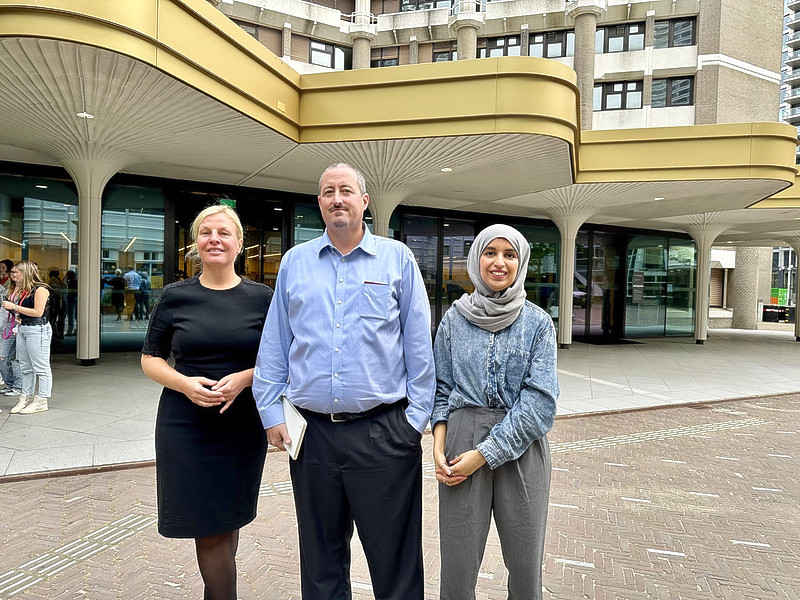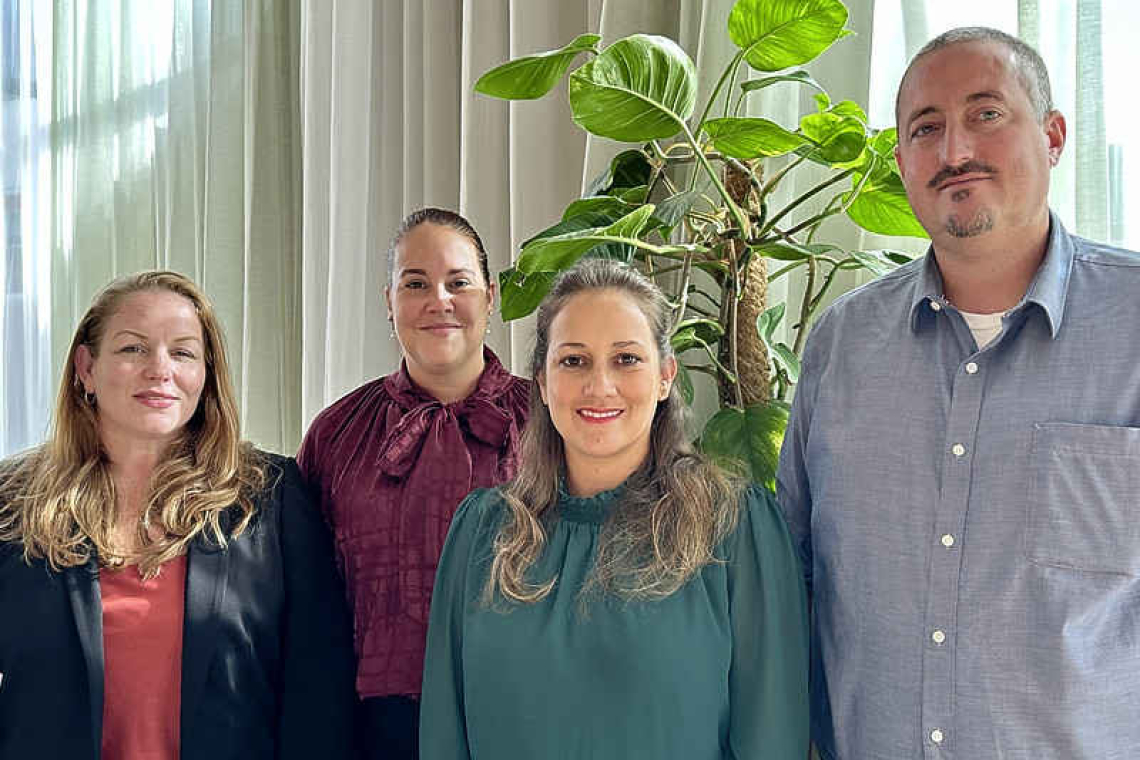The Saba delegation in The Hague. From left: Finance Department Maureen Hassell-Van der Kaap, Senior Policy Advisor Nicole Johnson, Community Development Department Head Rosa Johnson-Hassell and Commissioner Bruce Zagers.
SABA--A four-member delegation headed by Commissioner Bruce Zagers was in The Hague from Monday, October 2, to Tuesday, October 10, for meetings with the different ministries and political organisations.

Commissioner Bruce Zagers (right) with caretaker State Secretary of Kingdom Relations and Digitisation Alexandra van Huffelen (left) and chairman of the Social Minimum Committee Caribbean Netherlands Glenn Thodé at the presentation of the social minimum Caribbean Netherlands report in The Hague Friday, October 6.

Commissioner Bruce Zagers (centre) had meetings with several members of the Dutch Second Chamber, including Attje Kuiken of the Labor Party PvdA (left) and Kauthar Bouchallikh of the green left party GroenLinks (right).
There were multiple reasons for going to The Hague at this time, explained Zagers. Meeting with the ministries and political organisations was important time-wise with the November 22 Dutch Second Chamber elections.
Another important topic on the agenda was the drafting of the Saba Package 3.0, an agreement in which the public entity Saba and the Dutch government state their shared ambitions to work on Saba’s further development. Saba’s agenda was discussed with several political parties.
Social minimum
The implementation of a social minimum for the Caribbean Netherlands islands, including Saba, and the eradication of poverty were discussed with the ministries. The Saba delegation attended the presentation of the report of the Social Minimum Committee Caribbean Netherlands, chaired by Glenn Thodé, to caretaker Minister for Poverty Policy, Participation and Pensions Carola Schouten and caretaker State Secretary of Kingdom Relations and Digitisation Alexandra van Huffelen on Friday, October 6.
The timing of the visit of the Saba delegation was also relevant because of discussions on the recent report of public sector consultancy bureau IdeeVersa about the amount of the free allowance for the public entities, Schouten’s visit to Saba at the end of October and Van Huffelen’s visit to the island in November.
The Saba delegation further used the opportunity to discuss the different projects that are in the pipeline for Saba, including the new Solar Park, the new Black Rocks Harbor, the new school buildings and agriculture initiatives.
Funding possibilities
There are different funding possibilities of the Dutch government that Saba can make use of for projects such as the SDE++ programme to stimulate sustainable energy production and
climate transition, the National Growth Fund and the Regio Deals.
Saba was offered assistance to write project proposals to apply for funding from these initiatives. “The funding opportunities are there, but we lack this specific capacity, technical expertise. It is important for Saba’s development that we bridge that gap for the many projects that we want to carry out. The offer to assist us with this is most welcome,” said Zagers.
At the end of the visit, the Saba delegation had a wrap-up meeting with Director General Kees van der Burg of the Ministry of Infrastructure and Water Management to talk about some of the sentiments and to share some views of the visit.
Close the gap
“Although there is opportunity to tackle the challenges that we face as an island and there are the reports of IdeeVersa and of the Social Minimum Caribbean Netherlands Committee, we lack a cohesive approach on how to close the gap and eliminate the backlogs,” said Zagers.
He also addressed the matter of the social minimum. “There is momentum now, there is some money because of the structural fund that was recently announced, but there is an election in November which could impact the momentum one way or another. Yet there is still not enough attention for the immense cost of living. Increasing the social benefits is not the only solution to solve poverty issues. There needs to be more focus on the layers that have been created that negatively impact prices on Saba,” he said.
Cost of living
To bring down the cost of living, the import system that is currently in place needs to change. It needs to be simplified, become more customer-oriented and reflect the small scale of Saba. “On an island where almost everything has to be imported, bureaucracy, an overdone import system and complex, cumbersome procedures, along with extremely high shipping rates, all have an adverse effect on prices.”
According to Zagers, efforts to make Saba more sustainable and to increase locally-grown produce do not show immediate results, while the reality remains that the island greatly depends on imports. “There should be a better balance between the different ministries to work on a more practical approach that works for our small scale.”
Overall, Zagers was positive about the visit to The Hague, as it also provided an opportunity to network, to discuss Saba’s agenda and to explore ways to jointly contribute to Saba’s development.
Besides Zagers, the delegation consisted of Finance Department Head Maureen Hassell-Van der Kaap, Community Development Department Head Rosa Johnson-Hassell and Senior Policy Advisor Nicole Johnson.
The delegation returned to Saba on Wednesday, October 11.







